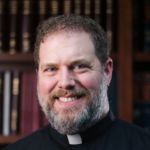
Despite the Lord’s insistence that his disciples listen to what the Pharisees say, his instruction to ignore or avoid what they do leaves us with a rather bad impression of their religious example. This is a regular problem in salvation history.
Our reading from Malachi comes at a moment after the exile, when Israel’s priests are her only real leaders—the Persians have allowed the Jews to return to their homeland, but they remain a subject people without their own government. And it seems that the priests in this era largely squandered the opportunity for spiritual leadership. Instead of teaching and blessing, they have led astray and cursed. These priests are therefore rejected by God, condemned for their treachery.
But the damage is done. In the focus this week on spiritual leadership gone awry, we might as well name some realities of the modern Church. The clerical abuse scandal in this country, and in many other countries, has left and continues to leave gaping wounds in the body of the faithful. On any given day, more people leave the Catholic Church in America than join it, and it is not usually hard to see why.
The crisis of trust is at times overwhelming. I say this not just from reading the news—like the news that priests, as a group, do not trust the bishops, as a group—but from the nonstop reality of those in the confessional struggling with what priests, bishops, and popes have said and are saying. So these hard words from Malachi and Matthew—and less directly from St. Paul—seem to apply pretty pointedly at some of our leaders. Why is it so hard for the Holy Father to give a clear “yes” or “no” to a question of fundamental Catholic doctrine? Why do the bishops, and the Roman authorities, continues to say one thing and do another when it comes to dealing with corruption and abuse?
I wish I knew, but I don’t. I know that all of us will answer before the dreadful judgment of God. And it is not especially useful to speculate about the motives and intentions of those above us in the Church’s hierarchy. Our job is not to judge authority, but to be judged by ultimate authority: like those in the first century, we could easily become so distracted by the hypocrisy of the Pharisees that we neglect to hear their legitimate teaching, which ultimately has nothing to do with them and everything to do with God.
“Call no one on earth father,” Jesus says. We all know the tired Protestant gloss on this, which seems to think it a nail in the coffin for Catholic understandings of priestly ministry. Anyone who knows how to google something can figure out pretty quickly that, in the context of both the whole Gospels and the New Testament, the Lord is speaking in rhetorical hyperbole. That is, the apostles themselves, and the entire early Church, did not seem to think it problematic to refer to elders and non-family members as “father.” In fact, we might go a little farther and speak directly to the supposed “problem” of the hierarchical priesthood and the “priesthood of all believers.” Catholics just do believe in both. Period. We have priests who minister at the altar, and at the same time, we all participate in the priestly identity of Christ.
That nuanced understanding of priesthood should help us understand what’s at stake in the Lord’s exaggerated claim that we should call no one father. The fact that we have spiritual fathers and mothers, the fact that there are authorities over us, does not rid us of the responsibility for our own minds and our own wills. It’s insufficient for me to say, “Oh, well, my bishop told me to do this, so that’s all there is to it.” If it’s a simple legal or canonical matter, that may be the case. But “father knows best” doesn’t work very well as an absolute theological principle when “father” is a fallible human being.
Where I’m going with this isn’t to give you a primer on ecclesiastical dissidence. Lord knows that’s not what we need. What we need is just plain holiness, and the clear obedience to the God who is the ultimate father of all. That never requires a bad attitude toward the hierarchy, as tempting as it may be.
You see, all the words of Malachi, and of Matthew, don’t just slide over all of us to hit the ultimate target of the Important People in charge. Because you and I are members of Christ’s body. We are a priestly people. We may not offer the Holy Sacrifice of the Mass in persona Christi with consecrated hands at the altar, but we do all participate in the offering in our own priestly way—the prayers of the Mass itself affirm this over and over, from the “Pray, brethren” invitation to the Roman Canon’s reference to the faithful who “themselves offer” sacrifice united with the sacrifice of the altar. Likewise, all God’s holy people have a “priestly” ministry of prayer and sacrifice and intercession in the world. They have a ministry of mediation, even, between God and the world, just by being baptized Catholics in the world.
Here’s what Peter Kreeft says, and let this sink in: “Not everyone we meet reads Paul’s epistles, or the rest of the Bible, but everyone we meet reads us. We are Christ’s epistles, whether we like it or not.” Perhaps we ought to add: not everyone we meet cares about what the pope says; not everyone we meet cares about our little struggles in parochial life; not everyone we meet even has any clue what a Catholic or a Christian is . . . but everyone we meet sees us, reads us, has the opportunity to know Christ—or reject Christ—in us.
What would it look like if every Catholic took that idea to heart? I think it would be explosive in the best possible way.



